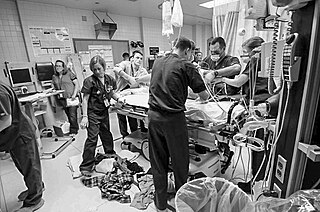
Emergency medicine is the medical speciality concerned with the care of illnesses or injuries requiring immediate medical attention. Emergency physicians specialise in providing care for unscheduled and undifferentiated patients of all ages. As first-line providers, in coordination with emergency medical services, they are primarily responsible for initiating resuscitation and stabilization and performing the initial investigations and interventions necessary to diagnose and treat illnesses or injuries in the acute phase. Emergency physicians generally practise in hospital emergency departments, pre-hospital settings via emergency medical services, and intensive care units. Still, they may also work in primary care settings such as urgent care clinics.

BRAC is an international development Organisation based in Bangladesh. In order to receive foreign donations, BRAC was subsequently registered under the NGO Affairs Bureau of the Government of Bangladesh. BRAC is the largest non-governmental development Organisation in the world, in terms of number of employees as of September 2016. Established by Sir Fazle Hasan Abed in 1972 after the independence of Bangladesh, BRAC is present in all 64 districts of Bangladesh as well as 16 other countries in Asia, Africa, and the Americas.

The Aga Khan Development Network (AKDN) is a network of private, non-denominational development agencies founded by the Aga Khan that work primarily in the poorest parts of Asia and Africa. Aga Khan IV succeeded to the office of the 49th hereditary Imam as spiritual and administrative leader of the Shia faith-rooted Nizari Ismaili Muslim supranational union in 1957. Ismailis consist of an estimated 7.5–10 million adherents.

Sir Charles Gairdner Hospital (SCGH) is a teaching hospital in Nedlands, Western Australia.
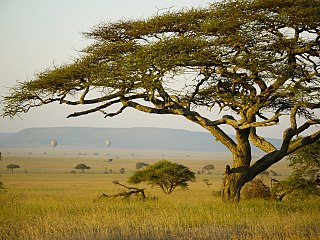
Mara Region is one of Tanzania's 31 administrative regions. The region covers an area of 21,760 km2 (8,400 sq mi). The region is comparable in size to the combined land area of the nation state of El Salvador. The neighboring regions are Mwanza Region and Simiyu Region, Arusha Region, and Kagera Region. The Mara Region borders Kenya .The regional capital is the municipality of Musoma. Mara Region is known for being the home of Serengeti National Park, a UNESCO World Heritage site and also the birth place of Tanzania's founding father Julius Nyerere. Under British colonial occupation, the Mara Region was a district called the Lake Province, which became the Lake Region after independence in 1961.
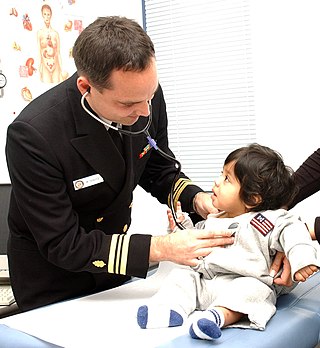
A nurse practitioner (NP) is an advanced practice registered nurse and a type of mid-level practitioner. NPs are trained to assess patient needs, order and interpret diagnostic and laboratory tests, diagnose disease, formulate and prescribe medications and treatment plans. NP training covers basic disease prevention, coordination of care, and health promotion, but does not provide the depth of expertise needed to recognize more complex conditions.
Opportunity International is a 501(c)(3) nonprofit organization chartered in the United States of America. Through a network of 47 program and support partners, Opportunity International provides small business loans, savings, insurance and training to more than 14 million people in the developing world. It has clients in more than 20 countries and works with fundraising partners in the United States, Australia, Canada, Germany, Switzerland, Singapore, Hong Kong and the United Kingdom. Opportunity International has 501(c)(3) status as a tax-exempt charitable organization in the United States of America under the US Internal Revenue Code.
The Australian Council For International Development (ACFID) is an independent national association of Australian non-government organisations (NGOs) working in the field of international aid and development. ACFID was founded in 1965, with Syd Einfeld as Chairman, and has over 130 members working in 90 developing countries and supported by over 1.5 million Australians. It lobbies for non-government aid organisations, and Australian government development aid.
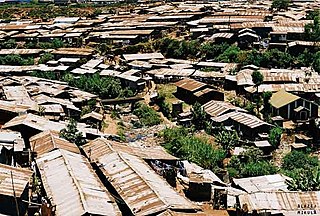
Founded in 2001 by Rye Barcott, Salim Mohamed, and the late Tabitha Atieno Festo, CFK Africa is an international non-governmental organization (NGO) based in the informal settlement of Kibera in Nairobi, Kenya. Registered as an NGO in Kenya and a 501(c)(3) in the US, CFK Africa is a pioneer of grassroots participatory development, and leads a community-based sports program, girls' empowerment centre, medical clinic, maternity centre, nutrition centre, young health and wellness centre, community-health outreach program, scholarship program, entrepreneurship and economic development initiatives, and a research-based initiative to improve educational quality in informal schools in Kibera. CFK Africa is also an affiliated entity at the University of North Carolina at Chapel Hill and has an office in the university's FedEx Global Education Center.
Australian People for Health, Education and Development Abroad (APHEDA), also known as Union Aid Abroad, is a non-government organisation of the Australian union movement. The non-government organisation was established in 1984 as the international aid agency of the Australian Council of Trade Unions. APHEDA was initiated in the pursuit of global justice through “stronger union and social movements, sustainable development programs, global solidarity and support in times of crisis” in Southeast Asia, the Pacific, the Middle East, South Africa and the Caribbean. APHEDA is also a registered charity with the Australian Charities and Not for Profits Commission.
The Tarime Goodwill Foundation (TGF) was started by Dr. Hudson Winani M.D. to address the unmet health needs of the Tarime District in the Mara Region of Tanzania. Most of the population of Tarime lives in rural areas where poverty is visible in many forms: lack of access to health care and education, malnutrition, and lack of access to transportation. Only 30–40% of children in the district have access to immunisations.

Healthcare in Thailand is overseen by the Ministry of Public Health (MOPH), along with several other non-ministerial government agencies. Thailand's network of public hospitals provide universal healthcare to all Thai nationals through three government schemes. Private hospitals help complement the system, especially in Bangkok and large urban areas, and Thailand is among the world's leading medical tourism destinations. However, access to medical care in rural areas still lags far behind that in the cities.
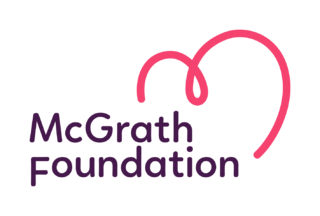
The McGrath Foundation is a breast cancer support and education charity in Australia, which raises money to place McGrath Breast Care Nurses in communities across Australia and increase breast health awareness. The charity was founded by Australian cricket player Glenn McGrath and his English-born wife, Jane McGrath, in 2005, following Jane's initial diagnosis and recovery from breast cancer. Jane died on 22 June 2008 at the age of 42.

The Rural Health Education Foundation was an Australian provider of television-based health education for doctors, pharmacists, nurses and allied health professionals.
The Fred Hollows Foundation is a non-profit aid organisation based in Sydney, Australia, which was founded in 1992 by eye surgeon Fred Hollows. The foundation focuses on treating and preventing blindness and other vision problems. It operates in Australia, South East Asia, East Asia, the Middle East, and Africa.
The Epilepsy Foundation is a large Australian charity, headquartered in Surrey Hills, Victoria, which provides evidence-based programs to support to people living with epilepsy, and all those who care for them. Epilepsy Foundation programs are delivered nationally through the Epilepsy Australia network of service delivery partners. The Epilepsy Foundation delivers services directly in New South Wales and Victoria. The Epilepsy Foundation aims to stop avoidable deaths, ensure children get a good education, help people get and keep their jobs and help people feel safe and connected. The Epilepsy Foundation works to ensure that "no one with epilepsy goes it alone".
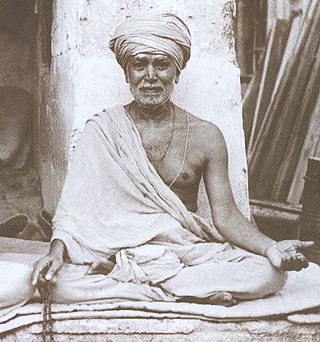
BAPS Charities is an international, religious, charitable organization that originates from the Bochasanwasi Akshar Purushottam Swaminarayan Sanstha (BAPS) with a focus on serving society. This focus on service to society is stated in the organization's vision, that "every individual deserves the right to a peaceful, dignified, and healthy way of life. And by improving the quality of life of the individual, we are bettering families, communities, our world, and our future." BAPS Charities carries out this vision through a range of programs addressing health, education, the environment, and natural disaster recovery. The organization's worldwide activities are funded through donations and are led by a community of over 55,000 volunteers who are mostly members of BAPS. The volunteers work with local communities and other charities and the organization's activities are mainly based out of their mandirs.
Pod Volunteer is a non-governmental volunteering organisation with an associated registered charity based in the United Kingdom.
Foundation for Africa is a Hungarian public benefit organization for development and aid created by a civil initiative. It was first registered in Hungary in 2002 and later in the Democratic Republic of the Congo in 2004. The main aims of the Foundation for Africa is to help development, aid and the forming of civil society through providing help in the fields of education, society and health care in Africa and organizing cultural programs and lectures to introduce the continent to Hungary.

The Turkish Cooperation and Coordination Agency is a government department subordinate to the Ministry of Culture and Tourism (Turkey). Focusing on development cooperation, TİKA works in more than 150 countries. TİKA is responsible for the organization of the bulk of Turkey's official development assistance to developing countries, with a particular focus on Turkic and African countries and communities. According to the OECD, 2020 official development assistance from Turkey increased by 1.2% to US$8 billion. As of January 2022, TİKA has undertaken 30,000 projects worldwide.











